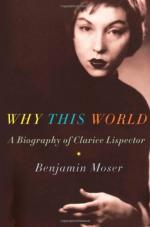|
This section contains 9,321 words (approx. 32 pages at 300 words per page) |

|
SOURCE: "The Eternal Non-Difference: Clarice Lispector's Concept of Androgyny," in Luso-Brazilian Review, Vol. XXXI, No. 1, Summer, 1994, pp. 39-56.
In the following excerpt, Sáenz de Tejada analyzes stories from Lispector's collections A bela e a fera, A legião estrangeira, Felicidade clandestina, and Onde estivestes de noite? and claims that even in her earliest work Lispector considers that androgyny is the natural state of the human being, as her female and male characters resist the gender roles expected of them by patriarchal society and seek self-awareness and authenticity.
The idea of androgyny receives special consideration in the context of contemporary feminist criticism1 as a way to question the veracity of sex differences, their immutability and their ultimate power to affect the life of the human being. It is a term generally used by feminist critics to symbolize the desired socio-political equality between men and women that women did...
|
This section contains 9,321 words (approx. 32 pages at 300 words per page) |

|


